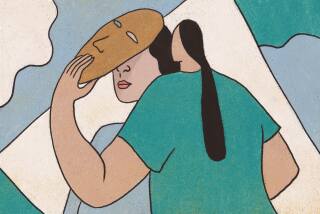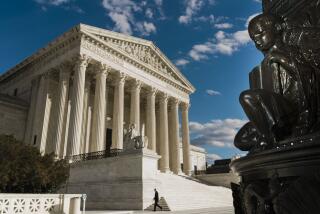Yet Another Issue in Surrogate Case : Custody: Woman’s attorney now says her Indian ancestry strengthens her claim to the child she was under contract to bear. Genetic tests may settle the dispute.
- Share via
SANTA ANA — Adding another twist to a complicated custody battle over an unborn baby, an attorney for surrogate mother Anna L. Johnson now maintains that her Indian ancestry strengthens her claim to the child.
But the newest claim in the unusual case was quickly countered Friday by American Indian officials and their attorneys, as well as by the attorney for the couple who hired Johnson to bear the child.
Johnson’s attorney, Richard C. Gilbert, said Friday that Johnson is part Cherokee and part Choctaw.
Her bloodline means that any child she bears falls under the provisions of the Indian Child Welfare Act, Gilbert said, which is designed to preserve Indian families by requiring tribes to be notified before Indian parents surrender their children for adoption.
“Indian blood created this baby,” Gilbert said. “Anna’s blood flows through that baby. No one can force her to give it up.”
Attorney Christian Van Deusen, who represents Mark and Crispina Calvert, the infertile couple who hired Johnson to bear their child, said Gilbert is wrong.
The baby was conceived from the Calverts’ egg and sperm in a laboratory and implanted into Johnson, so it lacks Indian ancestry, he said.
“That child has zero Indian blood,” Van Deusen said.
Gilbert said the baby, which is due next month, can be considered Indian because it is receiving products of Johnson’s circulatory system while in the womb.
But Cherokee and Choctaw officials, and Bertram E. Hirsch, a New York attorney who specializes in Indian family law, said they strongly doubt that the baby would be considered Indian simply because a woman of Indian heritage is carrying it.
“I’d be amazed if this child is going to be eligible for tribal membership,” Hirsch said. “Tribes invariably base their decision on blood, ancestry, and that isn’t created just by being in a womb for nine months.”
Gilbert has also cast doubt on the Calverts’ biological claim to the child by saying he cannot rule out the possibility that Johnson, 29, became pregnant through a sexual union, rather than from the in-vitro procedure.
If genetic tests prove that that was the case--and Johnson’s own egg was fertilized--the Calverts would lose their claim to the baby.
Van Deusen said the importance of Johnson’s Indian heritage to the battle for custody will be determined by those genetic tests.
“It’s simple,” he said. “If it turns out that the child is the genetic offspring of Anna Johnson, it’s the end of the case. We have no more claim on the child. There’s no controversy.
“If not, and the tests prove--as we strongly believe they will--that the Calverts are the child’s genetic parents, then we have no obligation to notify the tribes, because the child has no Indian ancestry,” Van Deusen said.
Hirsch said the baby’s potential for tribal membership “could change dramatically” if genetic tests prove that the baby was made from Johnson’s own egg.
Edwin R. Smith, tribal attorney for the Mississippi Choctaw tribe, said children are not eligible for membership in the tribe unless they are “lineal descendants” of a Choctaw, which hinges on the amount of Indian blood a child receives from its ancestors.
“I doubt this Indian birth mother would have a claim for tribal eligibility for that baby,” Smith said. “I’d think that if the egg and sperm are from non-Indians, the baby’s blood would be non-Indian too.”
Gwen Grayson, deputy director of community development for the Cherokee Nation of Oklahoma, said the baby’s ancestral bloodline would probably be the key factor in determining its tribal eligibility, but such a case “has never come up, and it would be a difficult one to work out.”
More to Read
Sign up for Essential California
The most important California stories and recommendations in your inbox every morning.
You may occasionally receive promotional content from the Los Angeles Times.










